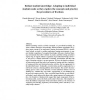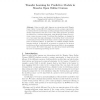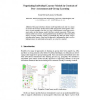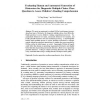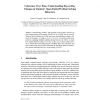AIED
2015
Springer
8 years 11 months ago
2015
Springer
Robust knowledge consists of both conceptual and procedural knowledge. In order to address both types of knowledge, offering students opportunities to explore target concepts in a...
AIED
2015
Springer
8 years 11 months ago
2015
Springer
Data recorded while learners are interacting with Massive Open Online Courses (MOOC) platforms provide a unique opportunity to build predictive models that can help anticipate futu...
AIED
2015
Springer
8 years 11 months ago
2015
Springer
Affect plays a central role in learning. Students’ facial expressions are key indicators of affective states and recent work has increasingly used automated facial expression tra...
AIED
2015
Springer
8 years 11 months ago
2015
Springer
Supporting students during learning tasks is the main goal of intelligent tutoring systems, and the most effective systems can adapt to students based on a model of their current s...
AIED
2015
Springer
8 years 11 months ago
2015
Springer
Instructional planning (IP) technology has begun to reach large online environments. However, many approaches rely on having centralized metadata structures about the learning obje...
AIED
2015
Springer
8 years 11 months ago
2015
Springer
This paper introduces learner model negotiation not only as a means to increase the accuracy of the learner model and promote metacognitive activities as in past examples, but also...
AIED
2015
Springer
8 years 11 months ago
2015
Springer
AIED
2015
Springer
8 years 11 months ago
2015
Springer
A distinctive feature of intelligent game-based learning environments is their capacity for enabling stealth assessment. Stealth assessments gather information about student compet...
AIED
2015
Springer
8 years 11 months ago
2015
Springer
AIED
2015
Springer
8 years 11 months ago
2015
Springer
Game-based learning environments hold great promise for engaging learners. Yet game mechanics can initially pose barriers for students with less prior gaming experience. This paper...
